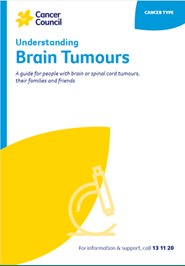- Home
- Brain tumours
- Diagnosis
- Your health care team
Your health care team
Your general practitioner (GP) or another doctor will arrange the first tests to assess your symptoms. If these tests do not rule out a tumour, you will usually be referred to a specialist, such as a neurosurgeon or neurologist. The specialist will examine you and arrange further tests.
If a tumour is diagnosed, the specialist will consider your treatment options. Often these will be discussed with other health professionals at what is known as a multidisciplinary team (MDT) meeting. During and after treatment, you will see a range of health professionals who specialise in different aspects of your care.
Health professionals you may see
| neurosurgeon | diagnoses and surgically treats diseases and injuries of the brain and nervous system |
| neurologist | diagnoses and treats diseases of the brain and nervous system, particularly those not requiring surgery; helps manage thinking and memory changes and seizures |
| radiation oncologist | treats cancer by prescribing and overseeing a course of radiation therapy |
| radiation therapist | plans and delivers radiation therapy |
| medical oncologist | treats cancer with drug therapies such as chemotherapy and targeted therapy (systemic treatment) |
| cancer care coordinator, patient navigator | coordinate your care, liaise with other members of the MDT and support you and your family throughout treatment; a clinical nurse consultant (CNC) or clinical nurse specialist (CNS) may also coordinate your care |
| nurse | administers medicines and drug therapies; provides care, information and support throughout treatment |
| pathologist, neuropathologist | analyse blood and tissue from the brain and spinal cord |
| rehabilitation specialist | recommends and oversees treatment to help you recover movement, mobility and speech after treatment and return to your usual activities |
| social worker | links you to support services and helps you with emotional, practical and financial issues |
| neuropsychologist | assesses people who have problems in thinking or behaviour caused by illness or injury (particularly to the brain) and manages their rehabilitation |
| psychologist, psychiatrist | help you manage your emotional response to diagnosis and treatment |
| physiotherapist, occupational therapist | assist with physical and practical problems, including restoring movement and mobility after treatment, and recommending aids, devices and equipment |
| speech pathologist, speech therapist | help with communication, swallowing and speech after treatment |
| exercise physiologist | prescribes safe and effective exercise to help people with medical conditions restore or improve their overall health, fitness, strength and energy levels |
| palliative care specialists and nurses | work closely with the GP and cancer team to help control symptoms and maintain quality of life |
→ READ MORE: Brain cancer treatment
More resources
Prof Lindy Jeffree, Director of Neurosurgery, Alfred Health, VIC; Caitriona Nienaber, 13 11 20 Consultant, Cancer Council WA; Prof Tamara Ownsworth, Clinical Neuropsychologist and Research Director, The Hopkins Centre, Griffith University, QLD; A/Prof Hao-Wen Sim, Medical Oncologist, The Kinghorn Cancer Centre and Chris O’Brien Lifehouse, NSW; Megan Trevethan, Clinical Specialist Occupational Therapy – Cancer and Lymphoedema Services, Princess Alexandra Hospital, QLD; Chris Twyford, Cancer Specialist Nurse, Canberra Health Services, Cancer and Ambulatory Support, ACT; Dr Adam Wells, Clinical Academic Consultant Neurosurgeon, The University of Adelaide, Royal Adelaide Hospital, SA.
View the Cancer Council NSW editorial policy.
View all publications or call 13 11 20 for free printed copies.

